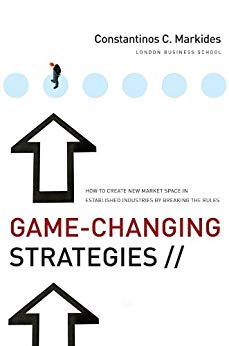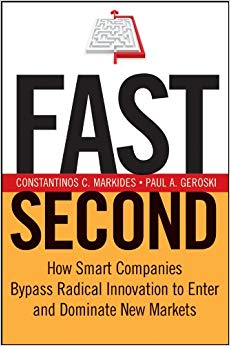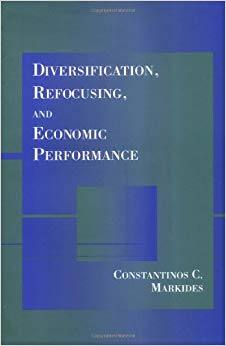Background
Constantinos C. Markides was born on November 24, 1960, in Nicosia, Cyprus. He is a son of Christodoulos Markides and Myrofora Pitsillou.

Boston, MA 02215, United States
Boston University
Cambridge, MA 02138, United States
Harvard University
Nicosia, Cyprus
Cyprus Development Bank
26 Sussex Pl, Marylebone, London, United Kingdom
London Business School
Cyprus National Guard (logotype)









(Game-Changing Strategies explains the reasons behind this...)
Game-Changing Strategies explains the reasons behind this puzzle and presents practical ideas on how established firms could not only discover new radical business models but also grow them next to their existing business models. The challenge for established firms is not the discovery of a new business model?the real challenge is how to make two business models coexist. This book offers advice on how established firms can implement structures and processes that make the new business model less conflicting and more palatable to the existing business.
https://www.amazon.com/gp/product/B00B9TNG34/?tag=2022091-20

(Constantinos Markides contends that the essence of busine...)
Constantinos Markides contends that the essence of business strategy is to allow a company to create and exploit a unique strategic position in its industry. To do so, the company must make clear and explicit choices based on the answers to three difficult questions: Who should I target as customers? What products or services should I offer them? How should I do this in an efficient way? Any company engaged in strategy making must raise these questions, identify possible answers, and then choose what to do and what not to do. The objective should be to come up with ideas that differentiate the firm from its competitors - and thus stake out a unique strategic position. In "All the Right Moves", a highly practical handbook on the fundamentals of strategy, Markides helps managers zero in on the critical choices that lie at the heart of all innovative strategies. More important, Markides argues that even the best of strategies have a limited life. It is not enough to develop a unique strategic position or to improve the existing one. Companies must continually create and colonize new strategic positions, a difficult if not impossible task for many established firms. Markides explains how to overcome the obstacles to innovation so that even well-established companies can innovate by breaking the rules of the game. "All the Right Moves" reveals how creative thinking leads to strategic innovation - the 'breakthroughs' that separate winning strategists from also-rans. Markides approaches strategic thinking as a creative process in which examining an issue from a variety of angles often proves more productive than merely gathering data, and experimenting with new ideas can be more effective than conducting much scientific analysis. He poses key questions for readers to ask as he guides them through a step-by-step framework for developing their strategic thinking skills. In a refreshingly clear and practical approach, "All the Right Moves" offers concrete advice for thinking through the tough choices that all business strategists must face. It distills the important elements of strategy into an easy-to-follow system for crafting today's -and tomorrow's- breakthrough business strategies. Constantinos Markides contends that the essence of business strategy is to allow a company to create and exploit a unique strategic position in its industry. To do so, the company must make clear and explicit choices based on the answers to three difficult questions: Who should I target as customers? What products or services should I offer them? How should I do this in an efficient way? Any company engaged in strategy making must raise these questions, identify possible answers, and then choose what to do and what not to do. The objective should be to come up with ideas that differentiate the firm from its competitors - and thus stake out a unique strategic position. In "All the Right Moves", a highly practical handbook on the fundamentals of strategy, Markides helps managers zero in on the critical choices that lie at the heart of all innovative strategies. More important, Markides argues that even the best of strategies have a limited life. It is not enough to develop a unique strategic position or to improve the existing one. Companies must continually create and colonize new strategic positions, a difficult if not impossible task for many established firms. Markides explains how to overcome the obstacles to innovation so that even well-established companies can innovate by breaking the rules of the game. "All the Right Moves" reveals how creative thinking leads to strategic innovation - the 'breakthroughs' that separate winning strategists from also-rans. Markides approaches strategic thinking as a creative process in which examining an issue from a variety of angles often proves more productive than merely gathering data, and experimenting with new ideas can be more effective than conducting much scientific analysis. He poses key questions for readers to ask as he guides them through a step-by-step framework for developing their strategic thinking skills. In a refreshingly clear and practical approach, "All the Right Moves" offers concrete advice for thinking through the tough choices that all business strategists must face. It distills the important elements of strategy into an easy-to-follow system for crafting today's -and tomorrow's- breakthrough business strategies.
https://www.amazon.com/gp/product/0875848338/?tag=2022091-20

(Discover why being a "fast second" is often more financia...)
Discover why being a "fast second" is often more financially rewarding than being at the cutting edge. If you get there first, you'll lead the pack, right? Not necessarily! The skill-sets of most established companies, say strategy experts Constantinos Markides and Paul Geroski, are far better suited to scaling up newly created markets pioneered by others (in other words, being "fast seconds") than to creating these markets from scratch. In Fast Second, they explore the characteristics of new markets, describe the skills needed to create and compete in them, and show how these skills match up with different types of companies. Drawing on examples of successful fast-second firms such as Microsoft, Amazon, Canon, JVC, Heinz, and many others, they illustrate how to determine which new markets have the potential to be successful and how to move into them before the competition does, when to make a move into a new market, how to scale up a market, where to position a company in the market, and whether to be a colonizer or a consolidator. Order your copy today!
https://www.amazon.com/gp/product/B000PY4A52/?tag=2022091-20

(During the 1980s a dramatic change in the evolution of th...)
During the 1980s a dramatic change in the evolution of the modern corporation took place. The phenomenon, which has been labelled "refocusing," "de-diversifying," "de-conglomerating," or simply "getting back to basics," has changed the terrain of American business. Diversification, Refocusing, and Economic Performance empirically examines the causes and consequences of this phenomenon from a corporate strategy perspective, uncovering the full scope and effects of corporate refocusing, its strategic logic, and the resultant managerial implications. Two key findings are that every firm has its own limit for diversification, beyond which profits will decline, and that there are certain similarities among those companies who choose to refocus. Starting right after the Second World War, many companies diversified widely, primarily in areas unrelated to their core businesses. In the 1980s, however, as corporate acquisitions and hostile takeovers ran rampant, this trend toward diversification and conglomeration began to reverse. Today, there is ample evidence that corporate managers are responding in significant numbers to takeover threats by shedding unlucrative divisions and subsidiaries and concentrating on boosting the core product lines that have been their company's bread-and-butter. Drawing on a data set of 250 of the top Fortune 500 companies, Constantinos Markides measures the extent of the refocusing phenomenon, proposes reasons for its current popularity, delineates the characteristics of firms that are refocusing, and discusses the effects of refocusing on company market value, profitability, and organizational structure.
https://www.amazon.com/gp/product/0262133113/?tag=2022091-20
Constantinos C. Markides was born on November 24, 1960, in Nicosia, Cyprus. He is a son of Christodoulos Markides and Myrofora Pitsillou.
Markides received his bachelor's degree (summa cum laude) from Boston University in 1983, becoming a Master of Arts next year. He then obtained his Master of Business Administration degree from Harvard University in 1985, as well as Doctor of Business Administration degree in 1990.
Markides began his career in 1979, serving as an officer at Cyprus National Guard for 2 years. In 1985 he became an intern at Cyprus Development Bank. His next working position was at London Business School, he was an assistant professor there for 4 years from 1990, becoming an associate professor that year. Markides served as a director of Accelerated Development Program at London Business School from 1993 till 1996.
Markides has studied how management ideas can be used to address social problems such as drug-related crime, poverty and malnutrition. He has published books on the theme.
Currently, Markides continues his activity at London Business School, working as a professor of strategy and entrepreneurship, he also holds the Robert P Bauman Chair of Strategic Leadership there. Additionally, he is a contributor to scholarly journals, including Sloan Management Review, Harvard Business Review, Business Strategy Review, Journal of International Business Studies and European Counsel, European Management Journal, Strategic Management Journal and Academy of Management Journal.
When a student, Markides was awarded the Alumni Student Award in Economics, in 1983.
For his great contribution to the educational process, he became a winner of the London Business School's Excellence in Teaching Award Across All Programmes (and Executive Education) in 1999, first time ever that the award was given. He also received LBS Innovation in Learning Teaching Award two years later. Markides's other awards for his activity as a teacher include LBS Exec Master of Business Administration Excellence in Teaching Award in 2004, as well as LBS 2005 Senior Faculty Teaching Award and Excellence in Teaching Award in 2009.
Markides won Igor Ansoff Strategic Management Award in 2000 for his book All the Right Moves: A Guide to Crafting Breakthrough Strategy. In 2005 his Fast Second: How Smart Companies Bypass Radical Innovation to Enter and Dominate New Markets was on the shortlist for the Financial Times-Goldman Sachs Management Book of the Year.
(Game-Changing Strategies explains the reasons behind this...)
(Constantinos Markides contends that the essence of busine...)
(Discover why being a "fast second" is often more financia...)
(During the 1980s a dramatic change in the evolution of th...)
Markides is a member of the Academy of International Business, the European International Business Association, the British Academy of Management, Strategic Management Society and the Cyprus Economic Society.
